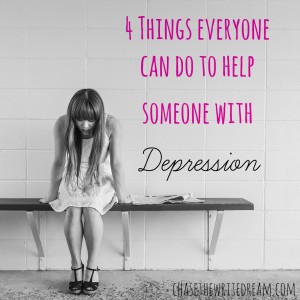Like everyone else, I was in complete shock when I found out that Robin Williams committed suicide. How could someone who brought so much joy and laughter to the world feel so empty on the inside that it caused him to take his life? I guess I didn’t realize how depressed he truly was, and how easy it can be to cover up the underlying feelings of despair.
Unfortunately, this is a much more common problem than people realize, with an estimated 16 million American adults having depression in 2012.
When you take into account that 38,364 people also committed suicide in 2010 alone, it should send off the message that people need help – and they aren’t getting it in a way that works for them.
Watching story after story of suicide and sorrow made me want to learn how to help someone with depression.
So what do we, as average citizens who don’t have the expertise to treat people with depression and self-harm symptoms, do to help these people?
Although you may not be able to provide counseling, there are at least four things you can do to help someone with depression.
1. One of the Simplest Things You Can Do to Help Someone with Depression is to Speak Words of Encouragement
I don’t think one day has passed by over the last couple of years in which I haven’t seen a negative comment of some sort being made, whether it was on the internet or in-person.
When you think about it, we’re all guilty of saying things that hurt others. Unfortunately, we will never really know if the person we are speaking those negative words to is suffering from depression, is thinking about harming themselves, or has another mental health issue that we are unaware of.
Words are powerful.
Can you imagine how things might change if you decided to speak words of encouragement to people rather than continue to tear them down?
This is especially important if you see someone who is suffering from signs of depression, such as being constantly sad, not having much energy, and losing interest in things they once enjoyed.
If you can’t say anything nice to these people, the least you can do is smile or wave at them. Even the littlest gestures can communicate that you truly care about their well-being.

2. Listen to Them
Did you realize that you can help someone with depression but just simply listening to them?
The way we listen to people has drastically changed over the years. Now that we have technology, it’s not uncommon to watch two people having a conversation while texting on their phones.
Although you may feel like you are multi-tasking in these moments, you are actually taking away valuable attention from the person you are speaking with.
If you do this to a depressed person who already feels hopeless and worthless, then your ‘multi-tasking’ could come across as being uncaring. Even worse, the person may feel as though they are less important than the phone you are texting on or the person you are sending messages to.
I want you to imagine something for the next few seconds:
Let’s say you are giving a presentation to 20 people about a new product that you are very excited about. As you go through your speech, you find that almost everyone in the room has been on their phones at some point. You find yourself getting more and more defeated as the presentation goes on because no one has given you their full attention. As you leave the room, you start talking down about yourself because you don’t feel as though your product was eye-catching enough or worthwhile.
Now, imagine how a person with depression feels after something like this – if a person without depression feels deflated, then how much worse do you think the person with depression will react? Odds are, it won’t do anything to help them feel better about themselves.
The moral of the story is that listening to someone, and by that I mean providing them with our FULL attention, demonstrates our willingness to cut out life’s distractions and focus on their particular wants and needs.
Even if the person only says a few words to you, at least you spent quality time with them – something they may not have experienced in a very long time.

3. Accompany Them to a Doctor Visit or Therapy Session
Going to the doctor or a therapist can be a traumatizing experience, especially if the individual with depression is so down in the slumps that they feel no one can help them. Additionally, getting mental health help seems to have a stigma around it, often causing people not to seek help in fear that people will say mean things to them in return (i.e. “You’re too weak to fix this on your own”).
Not only can your presence put the person more at ease, but it once again demonstrates your willingness to spend quality time with the individual.
4. Don’t Give Advice Beyond Your Knowledge
Some of us have the natural instinct to respond with solutions whenever we hear problems. Although we may speak with good intentions, our words may come across as being judgmental or uninformed.
The reality is that we don’t know what a person with depression is going through.
Sure, we may see signs and symptoms along the way, but we have no clue what thoughts are racing through their head at any given moment.
If you feel as though you want to address their depression, try saying something simple like “I’m here for you” or “I care about you.” Let the professionals do their job in addressing the symptoms and stick to your ability to provide support and a caring heart so that you don’t do more harm than good.
Final Thoughts
Although you may not be able to cure someone’s depression, you can truly make a lasting impact in their lives by simply being a support for them.
Remember, there are millions of people struggling with this terrible mental illness in our world today – the least you can do is smile at a stranger, ask a clerk at the grocery store how her day is going, or commit a random act of kindness.
Wishing you all the happiness that this world has to offer…



